List of United States Supreme Court cases, volume 159
| Supreme Court of the United States | |
|---|---|
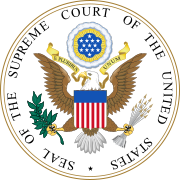 | |
| Established | March 4, 1789[1] |
| Location | Washington, D.C. |
| Coordinates | 38°53′26″N 77°00′16″W / 38.89056°N 77.00444°WCoordinates: 38°53′26″N 77°00′16″W / 38.89056°N 77.00444°W |
| Composition method | Presidential nomination with Senate confirmation |
| Authorized by | Constitution of the United States, Art. III, § 1 |
| Judge term length | life tenure, subject to impeachment and removal |
| Number of positions | 9 (by statute) |
| Website | supremecourt |
| This article is part of the series on the |
| Supreme Court of the United States |
|---|
 |
| The Court |
|
| Current membership |
|
| Lists of justices |
|
| Court functionaries |
|
|
| Constitutional law of the United States |
|---|
 |
| Overview |
|
| Principles |
|
| Government structure |
|
| Individual rights |
|
| Theory |
|
This is a list of the 62 cases reported in volume 159 of United States Reports, decided by the Supreme Court of the United States in 1895.
Justices of the Supreme Court at the time of volume 159 U.S.[]
The Supreme Court is established by Article III, Section 1 of the Constitution of the United States, which says: "The judicial Power of the United States, shall be vested in one supreme Court . . .". The size of the Court is not specified; the Constitution leaves it to Congress to set the number of justices. Under the Judiciary Act of 1789 Congress originally fixed the number of justices at six (one chief justice and five associate justices).[2] Since 1789 Congress has varied the size of the Court from six to seven, nine, ten, and back to nine justices (always including one chief justice).
When the cases in volume 159 were decided the Court comprised the following nine members:
| Portrait | Justice | Office | Home State | Succeeded | Date confirmed by the Senate (Vote) |
Tenure on Supreme Court |
|---|---|---|---|---|---|---|
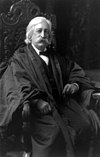
|
Melville Fuller | Chief Justice | Illinois | Morrison Waite | July 20, 1888 (41–20) |
October 8, 1888 – July 4, 1910 (Died) |
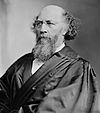
|
Stephen Johnson Field | Associate Justice | California | newly-created seat | March 10, 1863 (Acclamation) |
May 10, 1863 – December 1, 1897 (Retired) |
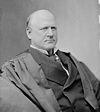
|
John Marshall Harlan | Associate Justice | Kentucky | David Davis | November 29, 1877 (Acclamation) |
December 10, 1877 – October 14, 1911 (Died) |
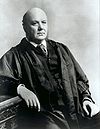
|
Horace Gray | Associate Justice | Massachusetts | Nathan Clifford | December 20, 1881 (51–5) |
January 9, 1882 – September 15, 1902 (Died) |
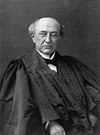
|
David Josiah Brewer | Associate Justice | Kansas | Stanley Matthews | December 18, 1889 (53–11) |
January 6, 1890 – March 28, 1910 (Died) |

|
Henry Billings Brown | Associate Justice | Michigan | Samuel Freeman Miller | December 29, 1890 (Acclamation) |
January 5, 1891 – May 28, 1906 (Retired) |
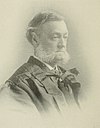
|
George Shiras Jr. | Associate Justice | Pennsylvania | Joseph P. Bradley | July 26, 1892 (Acclamation) |
October 10, 1892 – February 23, 1903 (Retired) |
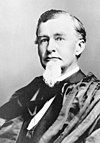
|
Howell Edmunds Jackson | Associate Justice | Tennessee | Lucius Quintus Cincinnatus Lamar | February 18, 1893 (Acclamation) |
March 4, 1893 – August 8, 1895 (Died) |

|
Edward Douglass White | Associate Justice | Louisiana | Samuel Blatchford | February 19, 1894 (Acclamation) |
March 12, 1894 – December 18, 1910 (Continued as chief justice) |
Notable Case in 159 U.S.[]
Hilton v. Guyot[]
In Hilton v. Guyot, 159 U.S. 113 (1895), the Supreme Court ruled that the recognition and enforceability of a foreign judgment rested on the "comity of nations," namely whether there would be any reciprocity and mutual recognition by the foreign jurisdiction from which the judgment was issued.[3] Hilton established the fundamental basis for the recognition and enforcement of foreign judgments in the United States,[4] remaining "the most detailed exposition of any American court" on this principle.[5] It is also viewed as the quintessential statement of comity in international law,[6] and is one of the earliest decisions of the U.S. Supreme Court to assert that international law is part of U.S. law.
Citation style[]
Under the Judiciary Act of 1789 the federal court structure at the time comprised District Courts, which had general trial jurisdiction; Circuit Courts, which had mixed trial and appellate (from the US District Courts) jurisdiction; and the United States Supreme Court, which had appellate jurisdiction over the federal District and Circuit courts—and for certain issues over state courts. The Supreme Court also had limited original jurisdiction (i.e., in which cases could be filed directly with the Supreme Court without first having been heard by a lower federal or state court). There were one or more federal District Courts and/or Circuit Courts in each state, territory, or other geographical region.
The Judiciary Act of 1891 created the United States Courts of Appeals and reassigned the jurisdiction of most routine appeals from the district and circuit courts to these appellate courts. The Act created nine new courts that were originally known as the "United States Circuit Courts of Appeals." The new courts had jurisdiction over most appeals of lower court decisions. The Supreme Court could review either legal issues that a court of appeals certified or decisions of court of appeals by writ of certiorari.
Bluebook citation style is used for case names, citations, and jurisdictions.
- "# Cir." = United States Court of Appeals
- e.g., "3d Cir." = United States Court of Appeals for the Third Circuit
- "C.C.D." = United States Circuit Court for the District of . . .
- e.g.,"C.C.D.N.J." = United States Circuit Court for the District of New Jersey
- "D." = United States District Court for the District of . . .
- e.g.,"D. Mass." = United States District Court for the District of Massachusetts
- "E." = Eastern; "M." = Middle; "N." = Northern; "S." = Southern; "W." = Western
- e.g.,"C.C.S.D.N.Y." = United States Circuit Court for the Southern District of New York
- e.g.,"M.D. Ala." = United States District Court for the Middle District of Alabama
- "Ct. Cl." = United States Court of Claims
- "Ct. Com. Pl." = Court of Common Pleas (a state court)
- The abbreviation of a state's name alone indicates the highest appellate court in that state's judiciary at the time.
- e.g.,"Pa." = Supreme Court of Pennsylvania
- e.g.,"Me." = Supreme Judicial Court of Maine
List of cases in volume 159 U.S.[]
| Case Name | Page & year | Opinion of the Court | Concurring opinion(s) | Dissenting opinion(s) | Lower Court | Disposition of case |
|---|---|---|---|---|---|---|
| White v. Van Horn | 3 (1895) | White | none | none | C.C.N.D. Tex. | affirmed |
| Townsend v. St. Louis & S.C. & M. Co. | 21 (1895) | Shiras | none | none | C.C.S.D. Ill. | affirmed |
| White v. Ewing | 36 (1895) | Brown | none | none | 6th Cir. | remanded to divided lower court |
| Horne v. Smith | 40 (1895) | Brewer | none | none | C.C.N.D. Fla. | affirmed |
| Wisconsin Cent. R.R. Co. v. Forsythe | 46 (1895) | Brewer | none | none | C.C.W.D. Wis. | reversed |
| Spencer v. McDougal | 62 (1895) | Brewer | none | none | C.C.W.D. Wis. | reversed |
| Texas & P. Ry. Co. v. Smith | 66 (1895) | Brewer | none | none | C.C.W.D. La. | reversed |
| Gray v. Connecticut | 74 (1895) | Field | none | none | Conn. | affirmed |
| United States v. Burr | 78 (1895) | Fuller | none | none | 2d Cir. | remanded to divided lower court |
| Grand Rapids & I.R.R. Co. v. Butler | 87 (1895) | Fuller | none | none | Mich. | affirmed |
| Ex parte Belt | 95 (1895) | Fuller | none | none | Sup. Ct. D.C. | habeas corpus denied |
| Brown v. United States | 100 (1895) | Harlan | none | none | C.C.W.D. Ark. | reversed |
| Central Land Co. v. Laidley | 103 (1895) | Gray | none | none | W. Va. | dismissed for want of jurisdiction |
| Hilton v. Guyot | 113 (1895) | Gray | none | Fuller | C.C.S.D.N.Y. | reversed |
| Ritchie v. McMullen | 235 (1895) | Gray | Fuller | none | C.C.N.D. Ohio | affirmed |
| Indiana v. Kentucky | 275 (1895) | Fuller | none | none | original jurisdiction | commissioners appointed |
| Simmons v. Burlington, C.R. & N. Ry. Co. | 278 (1895) | Shiras | none | none | C.C.S.D. Iowa | reversed |
| Richmond Nervine Co. v. Richmond | 293 (1895) | Brown | none | none | C.C.S.D. Ill. | reversed |
| Gilfillan v. McKee | 303 (1895) | Brown | none | none | Sup. Ct. D.C. | reversed |
| McKee v. Lamon | 317 (1895) | Brown | none | none | Sup. Ct. D.C. | reversed |
| McKee v. Latrobe | 327 (1895) | Brown | none | none | Sup. Ct. D.C. | affirmed |
| McCormick v. Hayes | 332 (1895) | Harlan | none | none | Iowa | reversed |
| Sioux City & S.P.R.R. Co. v. United States | 349 (1895) | Harlan | none | none | C.C.N.D. Iowa | affirmed |
| Chicago. M. & S.P. Ry. Co. v. United States | 372 (1895) | Harlan | none | none | C.C.N.D. Iowa | affirmed |
| Sioux City & S.P.R.R. Co. v. Countryman | 377 (1895) | Harlan | none | none | Iowa | affirmed |
| Sweet v. Rechel | 380 (1895) | Harlan | none | none | C.C.D. Mass. | affirmed |
| Borgmeyer v. Idler | 408 (1895) | Fuller | none | none | 3d Cir. | dismissed for want of jurisdiction |
| California v. Holladay | 415 (1895) | Fuller | none | none | Cal. | dismissed |
| Sonn v. Magone | 417 (1895) | Fuller | none | none | C.C.S.D.N.Y. | affirmed |
| Thorn Wire Hedge Co. v. Washburn & Moen Mfg. Co. | 423 (1895) | Shiras | none | none | C.C.N.D. Ill. | affirmed |
| United States v. Chaves | 452 (1895) | Shiras | none | none | Ct. Priv. Land Cl. | affirmed |
| The Incandescent Lamp Patent | 465 (1895) | Brown | none | none | C.C.W.D. Pa. | affirmed |
| Richards v. Chase Elevator Co. | 477 (1895) | Brown | none | none | C.C.N.D. Ill. | rehearing denied |
| Isaacs v. United States | 487 (1895) | Brown | none | none | C.C.W.D. Ark. | affirmed |
| Shiver v. United States | 491 (1895) | Brown | none | none | 5th Cir. | remanded to divided lower court |
| Patton v. United States | 500 (1895) | Brown | none | none | C.C.E.D. Pa. | affirmed |
| Thiede v. Utah | 510 (1895) | Brewer | none | none | Sup. Ct. Terr. Utah | affirmed |
| Wheeler v. United States | 523 (1895) | Brewer | none | none | C.C.E.D. Tex. | affirmed |
| Winona & S.P.L. Co. v. Minnesota I | 526 (1895) | Brewer | none | none | Minn. | affirmed |
| Winona & S.P.L. Co. v. Minnesota II | 540 (1895) | Brewer | none | none | Minn. | dismissed for want of jurisdiction |
| Weeks v. Bridgman | 541 (1895) | Fuller | none | none | Minn. | affirmed |
| United States v. American Bell Tel. Co. | 548 (1895) | Fuller | none | none | 1st Cir. | dismissal denied |
| Magone v. Wiederer | 555 (1895) | White | none | none | C.C.S.D.N.Y. | affirmed |
| De Jonge v. Magone | 562 (1895) | White | none | none | C.C.S.D.N.Y. | affirmed |
| Cowley v. Northern P.R.R. Co. | 569 (1895) | Brown | none | none | C.C.D. Wash. | reversed |
| Hilton's Administrator v. Jones | 584 (1895) | Brown | none | none | C.C.D. Neb. | affirmed |
| Clune v. United States | 590 (1895) | Brewer | none | none | S.D. Cal. | affirmed |
| McDowell v. United States | 596 (1895) | Brewer | none | none | 4th Cir. | remanded to divided lower court |
| Baltimore & O.R.R. Co. v. Griffith | 603 (1895) | Fuller | none | none | C.C.S.D. Ohio | affirmed |
| Folsom v. Township Ninety-Six | 611 (1895) | Gray | none | none | 4th Cir. | remanded to divided lower court |
| Rutland R.R. Co. v. Central Vt. R.R. Co. | 630 (1895) | Gray | none | none | Vt. Ct. Chan. | dismissed for want of jurisdiction |
| Stewart v. McHarry | 643 (1895) | Field | none | none | Cal. | affirmed |
| Mills v. Green | 651 (1895) | Gray | none | none | 4th Cir. | dismissed |
| Gillis v. Stinchfield | 658 (1895) | Fuller | none | none | Cal. | dismissed |
| Lambert v. Barrett | 660 (1895) | Fuller | none | none | C.C.D.N.J. | affirmed |
| Goode v. United States | 663 (1895) | Brown | none | none | D. Mass. | affirmed |
| Moore v. Missouri | 673 (1895) | Fuller | none | none | Mo. | affirmed |
| Bucklin v. United States I | 680 (1895) | Harlan | none | none | D. Kan. | dismissed |
| Bucklin v. United States II | 682 (1895) | Harlan | none | none | D. Kan. | reversed |
| The Bayonne | 687 (1895) | Fuller | none | none | C.C.S.D.N.Y. | dismissed for want of jurisdiction |
| Ansbro v. United States | 695 (1895) | Fuller | none | none | C.C.S.D.N.Y. | dismissed for want of jurisdiction |
| Little Rock & M.R.R. Co. v. East Tenn., V. & G.R.R. Co. | 698 (1895) | Fuller | none | none | C.C.W.D. Tenn. | dismissed |
Notes and references[]
- ^ Lawson, Gary; Seidman, Guy (2001). "When Did the Constitution Become Law?". Notre Dame Law Review. 77: 1–37.
- ^ "Supreme Court Research Guide". Georgetown Law Library. Retrieved April 7, 2021.
- ^ "Overview of U.S. Law - Proskauer on International Litigation and Arbitration". www.proskauerguide.com. Retrieved May 6, 2019.
- ^ David J. Levy, International Litigation: Defending and Suing Foreign Parties in U.S. Federal Courts (American Bar Association Tort Trial and Insurance Practice Section, 2003), p. 343, 346.
- ^ Levy, p. 343 (quoting Willis L. M. Reese, The Status in this Country of Judgments Rendered Abroad, 50 Columbia Law Review 783, 790 (1950))).
- ^ International Human Rights Litigation in U.S. Courts:, 2d rev. ed., p. 355.
See also[]
- Certificate of division
External links[]
- [1] Case reports in volume 159 from Library of Congress
- [2] Case reports in volume 159 from Court Listener
- [3] Case reports in volume 159 from the Caselaw Access Project of Harvard Law School
- [4] Case reports in volume 159 from Google Scholar
- [5] Case reports in volume 159 from Justia
- [6] Case reports in volume 159 from Open Jurist
- Website of the United States Supreme Court
- United States Courts website about the Supreme Court
- National Archives, Records of the Supreme Court of the United States
- American Bar Association, How Does the Supreme Court Work?
- The Supreme Court Historical Society
- Lists of United States Supreme Court cases by volume
- 1895 in United States case law

